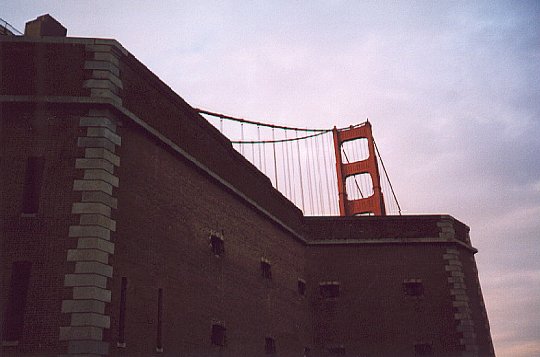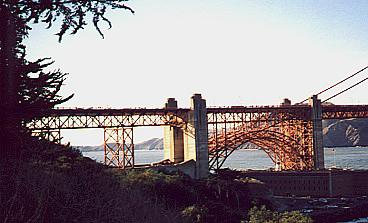
|
The Spanish & Mexican Period
In 1793-94, Spanish settlers chose a high white cliff at the entrance to the Bay as the
site for an adobe fort known as El Castillo de San Joaquin, built with Native American labor.
In 1821, Mexico gained its independence from Spain and also gained California. The Mexican Army
abandoned El Castillo in 1835.
|
Early U.S. Defense
At the end of the Mexican War in 1848, the U.S. possessed California. Army engineers saw
a strategic need to use this site for defense. In 1855, a 10-gun battery was constructed on
the bluff above the fort.
|
The Fort's Construction
Designed by a board of Army engineers, Fort Point was built between 1853 and 1861 at a cost
of about $2.8 million. With outer walls 5 - 7 ft. thick, the fort held 90 arched gun rooms called
casemates. Building materials included over 8 million bricks, and granite from China and California.
|
|
The Fort's Armament
At the start of the Civil War in 1861, the fort's soldiers were armed with 55 guns and 11
mortars. After the war, the Army installed powerful hollow-cast iron guns designed by
Bvt. Brig. Gen. Thomas Rodman. These Rodman guns, positioned in the lower-level casemates, could
fire 128-pound solid shot up to 3.2 miles. Fort Point boasted as many as 102 cannons.
|
|
The Troops
During the Civil War, the fort was occupied by soldiers from the 3rd U.S. Artillery, 9th U.S.
Infantry, and 8th California Volunteer Infantry regiments. In June, 1865, the fort accomodated its
largest garrison -- 456 enlisted men and 15 officers.
|
|
The Earthquakes
Damage from major quakes in 1906 and 1989 included a 2 - 6" gap between the outer wall and
the brick arches framing the soldiers' quarters.
|

|
|
Then Came the Bridge
At the early stages of planning for the Golden Gate Bridge, Fort Point was to be demolished.
But the engineers figured out how to spare the fort by the inclusion of the bridge's steel arch.
During the bridge's construction from 1933 to 1937, the fort served as base of operations.
|
|
WWII to the Present
Between 1941 and 1943, soldiers of the 6th US. Coast Artillery Regiment guarded the Golden Gate
with rapid-fire cannon and searchlight. Although no battle ever occurred at Fort Point, the public
wanted the site preserved in the years following the Second World War. With inspiration from
the early efforts of the Fort Point Museum Association, the fort was designated a National Historic Site
in 1970 by Congress.
|